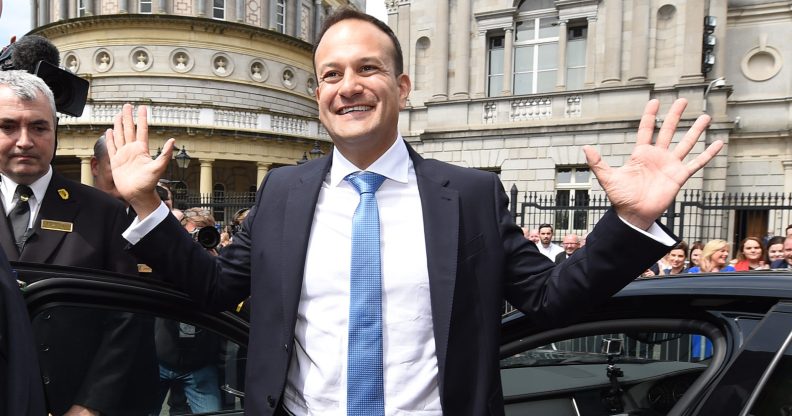Irish PM Leo Varadkar: I told the DUP to stop blocking equal marriage in Northern Ireland

Charles McQuillan/Getty
Ireland’s newly-appointed PM Leo Varadkar has revealed he pressed Northern Ireland’s DUP on equal marriage.
Leo Varadkar, who took office as Ireland’s Taoiseach last week, came to London today for talks with UK Prime Minister Theresa May about Northern Ireland.

After failing to win a majority in the UK’s general election, Mrs May is trying to seal a deal with Northern Ireland’s ultra-conservative Democratic Unionist Party in order to prop up her government.
The DUP has a long history of homophobia, and continues to employ peace process powers to override votes in favour of equal marriage in the Northern Irish Assembly.
Mr Varadkar, one of three openly gay world leaders currently in office, revealed today that he has pressed the DUP over their questionable use of ‘Petitions of Concern’ to block all progress on marriage equality.
Speaking in a joint press conference with Theresa May, the gay world leader said: “I met with Arlene Foster and the DUP last week in Dublin, and at that meeting I expressed my very strong view that marriage equality should be permitted in Northern Ireland.
“The majority of people in Northern Ireland want that, the majority of members in the Northern Ireland Assembly want that, and I expressed very clearly my view that the Petition of Concern mechanism should not be used to block marriage equality in Northern Ireland.
“As you can appreciate, Arlene Foster and the DUP have a different view on this matter. They made me aware of their views.
“There wasn’t a meeting of the minds on this issue, but it’s not one that I’m not going to continue to raise. I will certainly continue to raise it.”
Petitions of Concern were a power introduced under the Good Friday Agreement to promote cross-community collaboration, but the DUP continues to employ the law even though same-sex marriage is legal in the rest of the UK and in the Republic of Ireland.
Mr Varadkar, who came out as gay while campaigning for equal marriage in the Republic of Ireland in 2015, added: “Of course, I stand here as someone who was a member of the government that brought about a referendum on marriage equality in Ireland.
“Prime Minister May was a member of the Conservative Party government that brought about marriage equality [in England and Wales].
“I don’t think there is any prospect that marriage equality will not continue in Ireland and in Britain, the only question is when – not whether – it will come about in Northern Ireland.”
Responding to his comments, Theresa May failed to address the issue of marriage equality in Northern Ireland.
She said: “Just to confirm, we remain absolutely committed as the UK government to equal rights.
“We do have a good record as the Taoiseach has just expressed, not just on same-sex marriage but on issues like Turing’s Law.
“We will be continuing to champion equal rights.”
Democratic Unionist Party leader Arlene Foster recently insisted gay people don’t really want to get married anyway.
She said: “This suggestion that every single person who’s a homosexual wants to change the definition of marriage is actually wrong.
“I know plenty of people in that community who don’t want to see marriage redefined and are quite content to live in partnership… it’s all become a bit of a storm in a teacup.”
A DUP minister previously branded LGBT Pride events “totally repugnant”.
Among the ten MPs that the Tories want to bring onside is Ian Paisley Jr, the son of ‘Save Ulster from Sodomy’ leader Ian Paisley who founded the DUP.
Paisley Jr has spoken of his “hatred” of homosexuality, saying: “I am pretty repulsed by gay and lesbianism. I think it is wrong. I think that those people harm themselves and – without caring about it – harm society.”
The MP defended his comments in 2013, saying: “I am repulsed by many things.The actions, and not specifically the individuals. I am repulsed by people who are not homosexual as well sometimes.”
Related: Meet the DUP homophobes who now hold the keys to power in the UK

